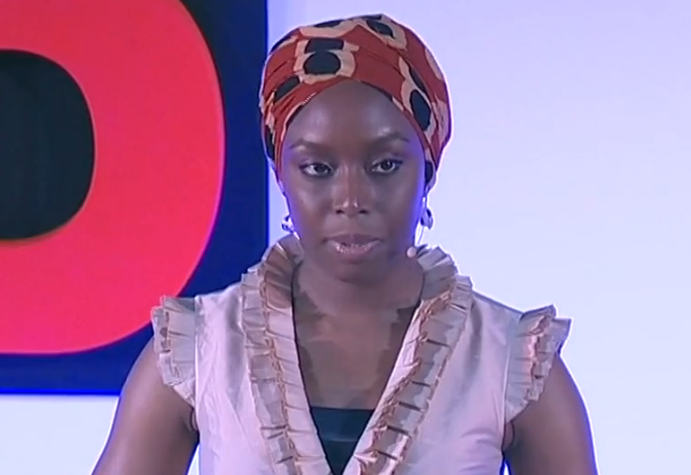When I learned, some years ago, that writers were expected to have had really unhappy childhoods to be successful,
当我多年前听说作家们必须有极其不幸的童年才能取得成功的时候,
I began to think about how I could invent horrible things my parents had done to me.
我开始思考如何捏造一些我父母对我做过的恶行。
But the truth is that I had a very happy childhood, full of laughter and love, in a very close-knit family.
但是事实上,我的童年非常愉快,充满了欢笑和关爱,也有着一个非常亲密的家庭。
But I also had grandfathers who died in refugee camps.
但我也有在难民营中死去的祖父。
My cousin Polle died because he could not get adequate healthcare.
我的表兄Polle因为无法得到充足的医疗而去世。
One of my closest friends, Okoloma, died in a plane crash because our fire trucks did not have water.
我最亲近的朋友之一Okoloma,死于一场飞机失事,因为我们的消防车中没有水。
I grew up under repressive military governments that devalued education,
我在不重视教育、充满压迫性的军权政府下长大,
so that sometimes, my parents were not paid their salaries.
以致于我的父母有时根本拿不到他们的工资。

And so, as a child, I saw jam disappear from the breakfast table,
因此,年少的我目睹果酱从早餐桌上消失,
then margarine disappeared, then bread became too expensive, then milk became rationed.
随后黄油也消失了,面包变得无比昂贵,牛奶需要限量供应。
And most of all, a kind of normalized political fear invaded our lives.
最重要的是,政治恐惧成了我们生活中习以为常的一部分。
All of these stories make me who I am.
所有这些故事都塑造了我。
But to insist on only these negative stories is to flatten my experience and to overlook the many other stories that formed me.
但如果我仅仅关注这些悲观的故事,那么我就简化了我的生命历程,并且忽视了许多其他同样塑造了我的故事。
The single story creates stereotypes, and the problem with stereotypes is not that they are untrue, but that they are incomplete.
单一的故事衍生单一的传统典型。而这些以偏概全的想法所存在的问题,并不是在于它们不真实,而是在于它们不完整。
They make one story become the only story.
它们将一个故事转变成了唯一的故事。












